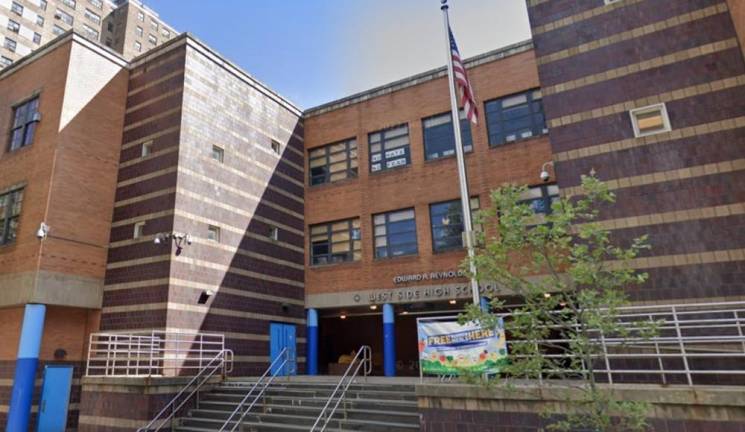Parents Suing To Prevent West Side High School Swap Denied Temp Injunction...Will Seek Permanent Relief In July
Parents of students at the Edward A. Reynolds West Side High School–which the Department of Education wants to swap with The Young Women’s Leadership School in East Harlem–filed a suit to try to get a temporary injunction blocking the transfer, which they say will disrupt the education for many lower-income students that face challenges in traditional classrooms. A judge denied the temporary injunction on June 30th, but a hearing for a permanent injunction is now scheduled for mid-July.

Parents of students at the Edwards A. Reynolds West Side High School are seeking to quash the Department of Education’s planned re-siting of the school to East Harlem, namely by filing a lawsuit.
On June 30th, a judge ruled that the temporary injunction they were seeking would be denied due to “the inability for the petitioners to establish imminent harm,” according to a lawyer representing the parents, Laura D. Barbieri of Advocates For Justice. However, she told Straus News that a hearing was now scheduled for July 14th to seek a permanent injunction, meaning that relief is not completely out of the cards for the petitioners.
The DOE claims that declining enrollment means that the school, which helps young teens who have fallen behind and offers a wide variety of support services, is being underutilized given the size of the current student body.
The “swap” of the school at 140 W. 102nd St.--called West Side High by locals--with The Young Women’s Leadership School has caused great distress for many members of the West Side community, who count on it for its auxiliary services such as a daycare center, health center, and kitchen. The school is a transfer school, meaning that per its stated educational mission “it assists students who have been unsuccessful in traditional high school settings.” According to the lawsuit, 43 percent of the student body is also disabled, making the school an invaluable educational resource for a considerable subset of the Upper West Side. The lawsuit seeks to preempt difficult alternative schooling plans for many families.
Essentially, the petition alleges that the NYC Department of Education (DOE) was negligent in various respects when its Panel of Educational Policy (or PEP) approved the swap, namely by violating Education Laws 2599 and 2853, New York City Human Rights Law 8-107, and the Public Officer’s or Open Meetings Law. In a memorandum in support of the petition, Barbieri states that the New York Civil Practice Law allows petitioners to ask the court (due to these violations) to find the current school swap “null and void.”
The suit’s argument largely revolves around the opacity and indifference of officials in the DOE’s PEP when it came to providing the necessary public information needed to justify a swap, the suit argues. For example, the suit claims the Educational Impact Statements that are required by law (such as analyses of adequate transportation, shared resources, and the accessibility of speciality classrooms) supposedly contained numerous omissions.
A new law–signed by Gov. Kathy Hochul in September 2022–that will require smaller class sizes as of this fall was also allegedly ignored. “An analysis of class sizes at West Side...reveals that a significant number of [its] classes are far larger than the class size cap in the new law,” the suit contends. The re-siting is intended to occur this fall, preventing the school from having the resources or time to come into compliance with the law. Moreover, the lawsuit asserts that “about 65 percent of high school students in District 4, where West Side will be re-sited if the proposal is approved, are in classes larger than the cap set out in the Class Size Law.”
The lawsuit also alleges a dereliction of duty when it comes to providing for the needs of disabled students after the swap. The lawsuit also claims that the DOE violated a New York City Human Rights Law by failing to “consider or analyze the resulting disparate impact that the EISs proposed would have on [disabled demographics].” The suit continues: “As a matter of policy and practice, the DOE does not explain how there will be enough space for the respective schools to provide the mandated services to which students with disabilities are entitled.”
Finally, the lawsuit notes that it believes members of the PEP violated transparency laws in the process of approving the PEP, namely by turning off their cameras at crucial Zoom meetings or allegedly not appropriately notifying the public of meeting locations.
Citing the the 2022 decision in Lynch v. New York City Civilian Rev. Bd., the lawsuit concludes that the the petitioners were “aggrieved and prejudiced” by these various violations, and would have “good cause” to void the decision approving the swap.
Barbieri told Straus News that the suit intended to stall but not end the decision to move West Side High. “If the DOE cures all of these problems...would the PEP reach the same conclusion? We don’t know the answer to that question, because they weren’t providing the information” she said, adding that “I don’t know that the PEP would approve the transfer or not–and that’s the whole point. You can’t not follow the law, and get the result that you want by virtue of the legal violations that you’re committing.”
Styer Nathaniel, a spokesperson for the DOE, told Straus News that “The Educational Impact Statement was appropriate and conducted in full accordance with the law.”